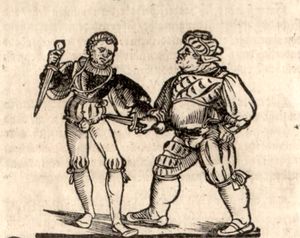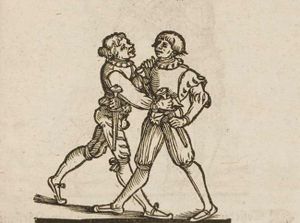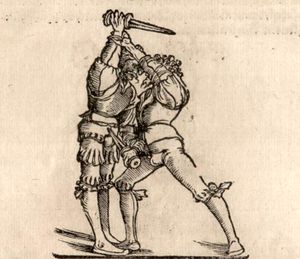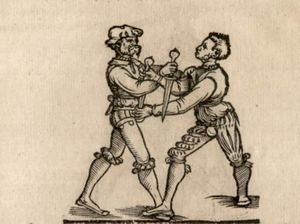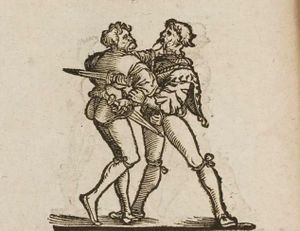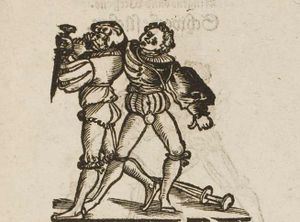|
|
You are not currently logged in. Are you accessing the unsecure (http) portal? Click here to switch to the secure portal. |
Difference between revisions of "Anonymous 16th Century Dagger Treatise"
| Line 1: | Line 1: | ||
== Treatise == | == Treatise == | ||
| − | {| class="wikitable | + | {| class="wikitable" width=2800 |
| − | |||
| − | |||
| − | |||
| − | |||
| − | |||
|- valign=top | |- valign=top | ||
Revision as of 18:38, 24 September 2014
Treatise
| Images | English Translation | Der Altenn Fechter anfengliche kunst | Mair's Dresden Version II | Mair's Vienna Version I (German) | Mair's Vienna Version I (Latin) | Mair's Munich Version II | Rostock Version |
|---|---|---|---|---|---|---|---|
| Text to copy over | |||||||
| A number of masterly plays / described visually / follows from here. | [XXXIIv] Ettlich meysterlich stuck / augenscheinlich angezeygt / volgen hernach. | ||||||
| Disabling stabs
At first and foremost in all dagger fighting is / that you diligently address all stabs / wherever they come / so you can be / in the way with the hand / and quickly attend to your deeds. |
Stoß abnehmen.
Das erst und nähest in allem tolchen kempffen ist / das du fleiß habest alle stich / woher sie kommen / so es dir werdenn mag / mit der handt abzuweisen / und eilens deins thuns achten. |
||||||
| Counter
Onward from here / as you come forth with your stab / pay attention that you also block your opponent's stab with your single hand / so that one can then come to the work / arm breaking / foot trapping and wrestling. |
Bruch
[XXXIIIr] Herwiderumb / So dir dein stich underkomen / hab acht das du deins gegenmans stich auch also mit deiner ledigen handt empfahest / damit man dan zur Arbeit / Armbrechen / Füßschrencken und Ringen kompt. |
||||||
| First Lockup
Firstly one must pay attention / to close off all stabs / so that he can't go on / and on his first extraction / to lock up your opponent / and have attention to advantage in wrestling. |
Erst Beschliessen
Es ist fürnemlich acht zu haben / alle stich dermassen zuuerfachen / das sie nit angehn / un damit sich am ersten befleissen / den gegen man zu beschliessen / und des Ringens vortheil acht zehaben. |
||||||
| Counter
As you thus have your stab taken down / cheated / and broken in the weak / thrust out with your hand to his next opening. |
Bruch
So dir dein stich also undernommen / überforteylt / und in die schwech bracht / stoß ihn drauß mit deinr hand in die nähst blöß. |
||||||
| Always mark to follow after the elbow with the hand in the thrust. It gives him a forceful / and good push after. | Zemercken das alwege der elpogen der hand mit dem stoß nachvolgen sol. Es gibt ihm ein gwalt / und gutten nachtruck. | ||||||
| Opposing
If he stabs you from the Roof / then come ahead and block his right hand with your left and attack him again to the torso. |
[XXXIIIv] Begegnen.
Stoßt dir einer vonn Tach / so fürkom und empfahe seine rechte handt mit deiner lincken unnd setz ihme wider an sein gemacht. |
||||||
| Counter
As you have thus had your stab taken down / then twist his stab up also toward your body / off with your left hand / push his right hand thus toward his left side / Stride with your right thigh / below his / throw him thus with your left arm / and do this nimbly / just as / you have trapped him by his right hand. |
Bruch
So dir einer also deinen Oberstich undernommen / so wende ihm auch seinen stich gegen deiner gemacht / mit deiner linckenn hand ab / truck sein rechte handt also gegen seiner lincken seitten / Schreit mit deim rechten schenckel / neben seinen / wirff ihn also mit deinem lincken arm / wie du ihm vor sein rechte handt gefasset / Und das bhend / In deß. |
||||||
| Wrenching off
If you do not try to block your opponent's stab with the hand / but rather consider if he would disengage you / then it is upon realising / that you thrust against him / and with your arm on his / come into the weak / drive above with your dagger / so that you grab with the point under his arm / pull to yourself / thus threatening(?) / as was described before with the sword. |
[XXXIVr] Abreissen.
Ob du deins gegen manns stich mit der handt nit trawest zu empfahen / sonder bsorgst er wird dirs verzucken / So ist am gewissesten / das du ihm entgegen stossest / und mit deinem arm an seinen / in die schweche komest / Far mit deinem tolchenn über / also das du die spitz widder under seinem arme begreiffest / zuck an dich / so entwerest / wie hievor vom schwert auch gmeldt. |
||||||
| Counter
As he has thus locked you / thrust quickly with your left to his right shoulder / in the weak / just as soon catch your dagger in the same left hand / let free the right / and as he follows / then catch him with his weakness / then throw him thus nimbly over your right leg. |
Bruch
So er dich also bschlossen / stoß eilend mit deinr lincken an sein rechte schulter / in die schweche / erwisch als bald dein tolchen inn dieselb linck handt / laß die recht darab / zucks an dich / unnd so er verfallt / so erwisch ihn mit seiner weyche / Magst ihn also behendiglich über dein recht beyn werffen. |
||||||
| Throwing Out
If one stabs toward you / then block his stab with your left hand / then thrust in again with your dagger below his right arm / so that you thus trap his back / step on his right foot with your left / as you trap him then throw him over / with both hands. |
[XXXIVv] Außwerffen.
Stoßt einer gegen dir / so empfahe seinen stich mitt deiner lincken handt / stoß also wider mitt deinem tolchen under seinem rechten arm hin / das du damit seinen rugken fassest / Tritt uff seinen rechten fuß mit deinem lincken / wirff ihn also darüber wie du ihn gefaßt / mit beden henden. |
||||||
| Counter
As one has trapped you so | then in the forcing see that you wrap your left hand around his neck / thus you force him around with you / and come away unthrown from him. |
Bruch.
So dich einer also gefasset / so lüg das du im schwang dein lincke hand umb seinen hals schlahest / so schwingstu ihn zegleich mit dir umb / und kompst ungeworffen von ihm. |
||||||
| Arm breaking
If one stabs to you / then catch him by the hand / and quickly turn yourself with your back to him. Lift yourself so that you break his arm over your right shoulder. |
[XXXVr] Armbrechen
Stoßt dir einer zu / so erwisch ihm die handt / und ker dich schnell mit deim rugken hinder ihn. Erheb dich das du seinen arm uff deiner achseln brechest. |
||||||
| Counter
As one would thus break your arm over his right shoulder / then quickly turn yourself around / slip with your head in under his arm / slap both hands onto his hand / the one he trapped you with / pull over over yourself / the arm over your shoulder / then do to him what he has would have / done to you. |
Bruch
So einer dir deinen arm also uff seiner achseln brechen will / so kere dich in eil umb / schlieff mitt deim kopf under deinem arme hin / schlahe bede hend an sein handt / damit er dich gefaßt / rück sie übersich /den arm uff dein achsel / so thustu ihn was er im sinne gehabt / dir zu thun. |
||||||
| Thus onward every one can take the other. | Also kann es fürter ein ieder dem andern nehmen. |

